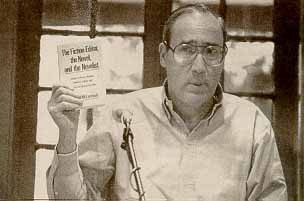Ex-publisher gives talk on book editing
The Daily Pennsylvanian
October 9, 1998
-
Ex-publisher gives talk on book editing
Photo by Anlaii Wagle
How often do Penn students get to eat dinner with the retired president of a major publishing company? As strange as such a situation might seem, that is exactly what happened Wednesday when Roy Gainsburg, president of St. Martin's Press from 1987 to 1997, spoke to a crowd of about 50 people at the Kelly Writers House. English Professor Al Filreis, the director of the Writers House, told the crowd that it was "personally exciting" to have Gainsburg talk, since he is Filreis' uncle. Gainsburg started his speech, entitled "The Role of Editors and Book Publishers in Fiction and Non-Fiction," by emphasizing that editing is not an easy job. It involves "round the-clock" work, but is still a very rewarding job, he explained.
Focusing on "trade" editing, which involves editing books of general interest, Gainsburg said a trade editor had four main roles: acquiring authors, editing, publishing and retaining the authors. Gainsburg added that non-fiction editing is easier than fiction editing, since extra care must be taken to prevent a fictional story from be-coming "confusing [and] unsatisfying," and as a result, probably "failing" to find an audience. When a student asked how to become a good editor, Gainsburg did not give a direct reply. Rather, he said to read a Thomas McCormack's book The Fiction Editor, the Novel and the Novelist, and said an editor needs more than "knowing how to read and being smart." Gainsburg also recommended that prospective editors work as editorial assistants at publishing houses. Although it is a tough, low-paying job, he said it is one of the best ways to move into editing.
Referring to editing as a trade, Gainsburg said editors should be taught to "diagnose and cure" a manuscript. There are some manuscripts, he added, that do not need work and some authors that do not want to be edited. During a question-and-answer session following his talk, Gainsburg gave advice to would-be editors. He said a major part of editing is "sensibility," that an editor must have the same instincts as the audience that will be reading a published work. Gainsburg acknowledged that editing was "hard work" but added that the industry is always in need of "good, bright people."
Filreis praised the speech, explaining that it was a "chance opportunity" and saying that he liked the fact that Gainsburg "spoke directly about his passion for books." Students also said they appreciated the chance to talk with Gainsburg. College senior Lisa Sandell said it was "great that the Writers House offers programs like this, adding that there "are not enough forums for specialty speakers" at Penn. Writers House resident coordinator Heather Starr said the speech was a "classic example of how the Writers House provides students with the opportunity to meet someone they respect, admire and wouldn't have access to otherwise."

